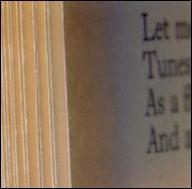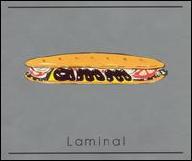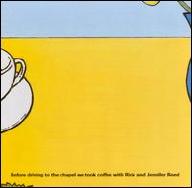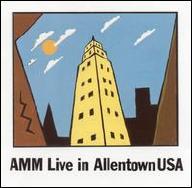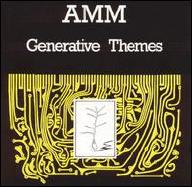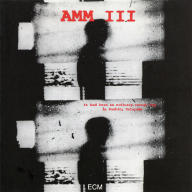AMM (the acronym's meaning is a mystery) were founded in 1965 by guitarist Keith Rowe, saxophonist Lou Gare, and Prévost, not as a band initially, but as an outgrowth of weekend experimental music workshop sessions at London's Royal College of Art. Rowe and Gare were members of Mike Westbrook's band; Prévost and Gare were also in a hard bop jazz quintet. While they were inspired by jazz musicians, they all felt constrained by the genre as a means for sonic exploration. They desired to create something of the moment that reflected freedom from musical tradition or history. They held this notion in common with the other emergent improv groups of the era including the Spontaneous Music Ensemble, founded by drummer/trumpeter John Stevens and alto and soprano saxophonist Trevor Watts.
For early performances, other musicians were free to join in, but participation in AMM gigs was often short-lived if their contributions were deemed to be lacking the proper spirit. (American soprano saxophonist Steve Lacy was a notorious early example of a musician asked to stop playing during one performance for this specific reason.) Eventually, the formal group settled on the lineup of Prévost, Rowe, Gare, bassist/cellist Lawrence Sheaff, and the already established composer, pianist, and cellist Cornelius Cardew. By early 1966, they were calling themselves AMM -- though a few early performances were mistakenly billed to the "Cornelius Cardew Quintet." After a few gigs, Cardew brought a pair of amplifiers in so other instruments could compete with the volume of Rowe's guitar. In addition to their own instruments, Cardew and Gare applied contact microphones to various common objects to amplify the sounds made by organic means. From the very beginning, no performance was ever planned in advance; each was spontaneous, and therefore unique. The musicians tended to avoid conventional melody, harmony, or rhythm in order to seek an ensemble sound that obscured individual roles, sometimes making it difficult to determine which instrument made a specific sound. After numerous shows in late 1965 and early 1966, AMM released their freshman outing, Ammmusic 1966, on Elektra Records. According to critics, it bore a few similarities to free jazz -- due, no doubt, to the participation of Gare's saxophone. Sheaff left the group shortly after the first album was released and, by all accounts, completely stopped making music.
A performance on June 12, 1968, at the Crypt was recorded and released. In subsequent decades it has eclipsed the importance of its predecessor and later recordings, as it established the droning, long-form approach that characterized AMM's m.o. Further "out" than the earlier record, The Crypt sessions have been reissued numerous times -- even before topping the charts. They were issued twice during the 1980s and at least twice more in the 1990s, and are currently billed as The Crypt: The Complete Sessions on the group's Matchless Recordings label. Composer Christian Wolff performed with AMM in 1968, and pianist (and future member) John Tilbury would sit in for Cardew at gigs when he was unavailable. A split album with Musica Elettronica Viva (MEV) entitled Live Electronic Music Improvised was issued on Mainstream in 1970.
Cardew and Rowe became committed to socialism and to Maoism and thought that the group's music should reflect that sociopolitical outlook. This caused tension within the ensemble, resulting in AMM performances by alternating duos: Rowe and Cardew, and Prévost and Gare. This tension led to the group becoming largely inactive in 1972. When they did perform, it was the duo of Prévost and Gare, resulting in the album To Hear and Back Again from 1974 that went unreleased until 1978 as the debut offering from Matchless. By that time, Rowe had re-joined AMM and Gare had left. As AMM III, Rowe and Prévost released the acclaimed It Had Been an Ordinary Enough Day in Pueblo, Colorado for JAPO in 1980. The first Matchless version of The Crypt appeared in 1981; given over-the-top positive reviews from critics and the influence and promotion of John Peel, the record climbed and took over the pop charts for a week.
Tilbury formally joined AMM in late 1980. Unlike Cardew, his instrument was always recognizable, and his limpid, gentle playing style influenced the trio's output and performances -- even Rowe's physical approach to guitar shifted, becoming a more subtle canvas for his partners' input. This trio version of AMM lasted for approximately two decades, becoming a well-traveled, oft-recorded outfit who played not only across Europe but also North America. Numerous recordings appeared during this fruitful era, including 1983's Generative Themes, 1990's Combine And Laminates, the triple-length Laminal in 1996, Before Driving to the Chapel We Took Coffee with Rick and Jennifer Reed (1997), a split with Merzbow for FatCat in 1999, and Tunes Without Measure or End and Fine in 2001.
By the turn of the century, Rowe had started to explore other means of expression and collaboration outside AMM, recording solo for Erstwhile Records. Minute, a published collection of Prévost essays in 2004, offered some rather harsh criticism of Rowe and resulted in his (re)departure from AMM, leaving them once again a duo. Prévost and Tilbury recorded and performed as AMM, sometimes with guest collaborators who included saxophonist Evan Parker, Sachiko M, and David Jackman, to name just three. AMM issued their first outing as such with Norwich in 2005 and collaborated with saxophonist John Butcher on Trinity in 2009. A quintet version of AMM that included Butcher, Christian Wolff, and Ute Kanngiesser issued "Sounding Music" performed at the "Freedom of the City" festival, Conway Hall, London that year. The duo resumed recording as AMM with the following year's Uncovered Correspondence and 2011's Two London Concerts. In 2014, a document of their concert at CODES - The Festival of Traditional and Avant-garde Music in Lublin, Poland, were released as Place Sub. V, and a year later, another concert from 2012 at Festival Neposlušno in Ljubljana, Slovenia, was issued as Spanish Fighters.
Rowe re-joined AMM for a series of concerts in Europe in late 2015 through the middle of the following year. In 2017, Lou Gare passed away. In tribute, Matchless issued a three-disc set taken from three of those shows -- in London, Paris, and Trondheim, Norway -- as An Unintended Legacy in 2018. It included a 70-page booklet dedicated to Gare that included an AMM discography, photos, and essays by Paige Mitchell and Allen Fisher; Rowe; Prévost; and Gare. That same year, a digital-only collaborative release by Prévost and Tilbury from a 2016 Berlin performance with A Trio (Mazen Kerbaj, Raed Yassin, Sharif Sehnaoui) was issued as AAMM on Lebanon's Al Maslakh and re-released in physical form in 2019 with a bonus single by the Netherlands' Unrock label. ~ Thom Jurek, Rovi



